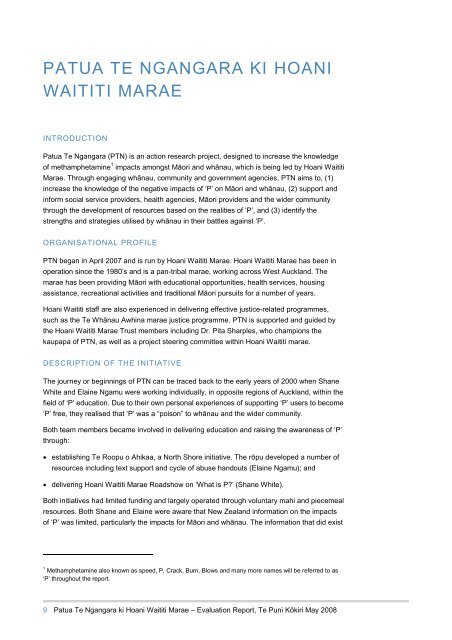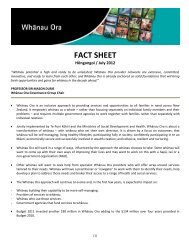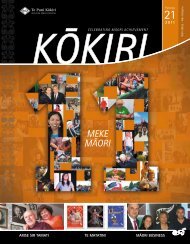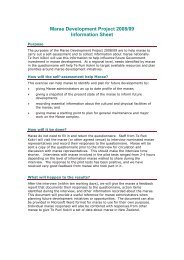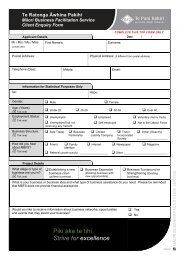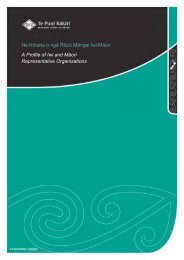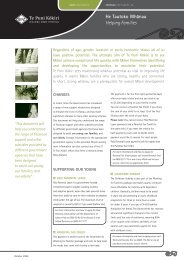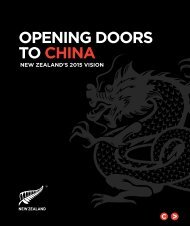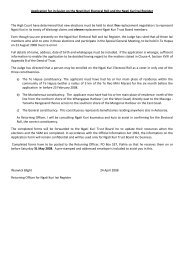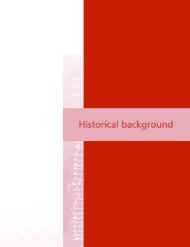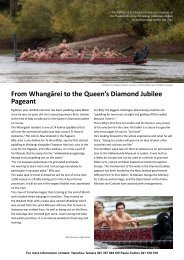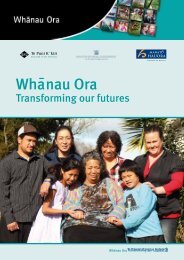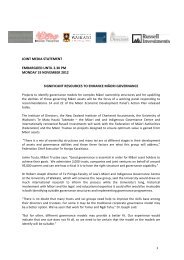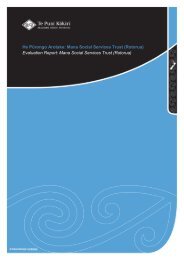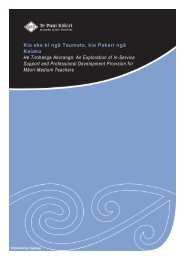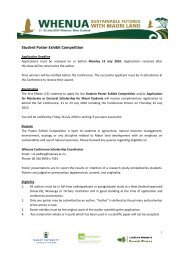Evaluation Report: Hoani Waititi Marae: PDF 1.4MB - Te Puni Kokiri
Evaluation Report: Hoani Waititi Marae: PDF 1.4MB - Te Puni Kokiri
Evaluation Report: Hoani Waititi Marae: PDF 1.4MB - Te Puni Kokiri
Create successful ePaper yourself
Turn your PDF publications into a flip-book with our unique Google optimized e-Paper software.
PATUA TE NGANGARA KI HOANI<br />
WAITITI MARAE<br />
INTRODUCTION<br />
Patua <strong>Te</strong> Ngangara (PTN) is an action research project, designed to increase the knowledge<br />
of methamphetamine 1 impacts amongst Māori and whānau, which is being led by <strong>Hoani</strong> <strong>Waititi</strong><br />
<strong>Marae</strong>. Through engaging whānau, community and government agencies, PTN aims to, (1)<br />
increase the knowledge of the negative impacts of „P‟ on Māori and whānau, (2) support and<br />
inform social service providers, health agencies, Māori providers and the wider community<br />
through the development of resources based on the realities of „P‟, and (3) identify the<br />
strengths and strategies utilised by whānau in their battles against „P‟.<br />
ORGANISATIONAL PROFILE<br />
PTN began in April 2007 and is run by <strong>Hoani</strong> <strong>Waititi</strong> <strong>Marae</strong>. <strong>Hoani</strong> <strong>Waititi</strong> <strong>Marae</strong> has been in<br />
operation since the 1980‟s and is a pan-tribal marae, working across West Auckland. The<br />
marae has been providing Māori with educational opportunities, health services, housing<br />
assistance, recreational activities and traditional Māori pursuits for a number of years.<br />
<strong>Hoani</strong> <strong>Waititi</strong> staff are also experienced in delivering effective justice-related programmes,<br />
such as the <strong>Te</strong> Whānau Awhina marae justice programme. PTN is supported and guided by<br />
the <strong>Hoani</strong> <strong>Waititi</strong> <strong>Marae</strong> Trust members including Dr. Pita Sharples, who champions the<br />
kaupapa of PTN, as well as a project steering committee within <strong>Hoani</strong> <strong>Waititi</strong> marae.<br />
DESCRIPTION OF THE INITIATIVE<br />
The journey or beginnings of PTN can be traced back to the early years of 2000 when Shane<br />
White and Elaine Ngamu were working individually, in opposite regions of Auckland, within the<br />
field of „P‟ education. Due to their own personal experiences of supporting „P‟ users to become<br />
„P‟ free, they realised that „P‟ was a “poison” to whānau and the wider community.<br />
Both team members became involved in delivering education and raising the awareness of „P‟<br />
through:<br />
establishing <strong>Te</strong> Roopu o Ahikaa, a North Shore initiative. The rōpu developed a number of<br />
resources including text support and cycle of abuse handouts (Elaine Ngamu); and<br />
delivering <strong>Hoani</strong> <strong>Waititi</strong> <strong>Marae</strong> Roadshow on „What is P‟ (Shane White).<br />
Both initiatives had limited funding and largely operated through voluntary mahi and piecemeal<br />
resources. Both Shane and Elaine were aware that New Zealand information on the impacts<br />
of „P‟ was limited, particularly the impacts for Māori and whānau. The information that did exist<br />
1 Methamphetamine also known as speed, P, Crack, Burn, Blows and many more names will be referred to as<br />
„P‟ throughout the report.<br />
9 Patua <strong>Te</strong> Ngangara ki <strong>Hoani</strong> <strong>Waititi</strong> <strong>Marae</strong> – <strong>Evaluation</strong> <strong>Report</strong>, <strong>Te</strong> <strong>Puni</strong> Kōkiri May 2008


